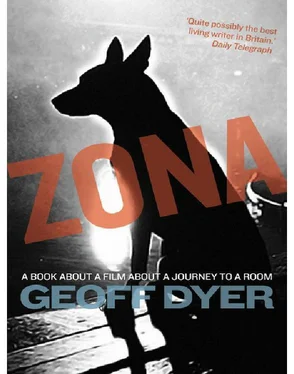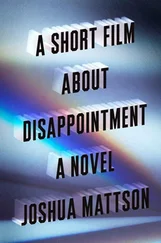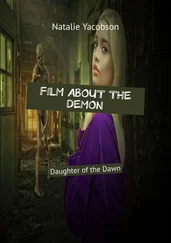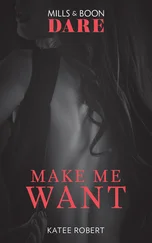They are all back where they were before Professor unveiled his bomb, his stainless steel IED, before the scuffle in this waterlogged place, on the threshold of the Room, whose light can be seen, off to the right. Stalker is on his knees, collapsed on the floor. Writer is holding forth like a detective who has just solved a difficult case, who has spotted the clues and unravelled the contradictions that escaped the attention of other, less subtle, minds. And he’s not finished. How do we know it’s true, that the Zone grants all your wishes? Who actually said that the Room granted these wishes? One assumes Writer is speaking to Stalker but Professor replies, He did, meaning Stalker, as if the whole idea of the Zone and the Room were entirely his invention. 43
Writer is at the edge of the Room and, overcome by his own oratorical prowess, stumbles forward, is about to fall into the Room, is about to tumble into having his own innermost wish accidentally realized — more sales than Wilbur Smith, more critical acclaim than Sebald, more chicks than Bukowski — but Stalker pulls him back and they huddle on the ground together. The phone is ringing again. Writer puts his arm around Stalker’s shoulders. Professor stands up, begins dismantling his thermos-bomb, chucking bits of it into the water, asking the question that is on everyone’s lips — What is the point in coming here?
The purpose of coming here was to get to the point where that question could be asked of oneself rather than someone else. There always comes a moment in the writing of a book when its purpose is revealed: the moment when the urge — Nabokov’s famous ‘throb’—that led one to consider writing it is made plain. Actually there are two moments, or, if it makes sense to put it like this, the moment comes in two phases. First when one realizes that yes, there is a book here — however faintly it can be discerned — not just a haphazard collection of jottings and crossings-out clustered round an inadequately formed idea. Since, in principle, getting to that point should be easy, it’s disheartening to find that so much time and energy have to be wasted, that so many pointless detours, irritating obstacles, self-imposed tests and excuses (that voice constantly whispering or crying out ‘Stop!’) conspire to get in the way. But at the point when you realize that there is a book, even a short one with little hope of critical approval or large sales, you see that all those diversions were necessary and inevitable and so, strictly speaking, were not diversions at all (even if the whole journey is, ultimately, no more than a diversion). From that point on — the point that Kafka said must be reached — there is no turning back and, despite setbacks, the going gets generally easier. The next moment comes not when the book is finished — that is better conceived as the last bit of the previous phase — but some time after it is published, when you see it for what it is (weirdly, page proofs always retain some of the glow of how it was intended to be rather than what it is). Then you see that actually those big desires and hopes, your deepest wishes, turned out not to be so deep at all, that actually even to consider life and writing in terms of a single wish is absurd, that there are numerous wishes and numerous books to be written — or, by reference to something mentioned earlier, further extensions (more rooms) to be built, more beer to be drunk, and more countries to be napalmed. You wonder if you wouldn’t have been better off summarizing a different film, Where Eagles Dare, say, or writing a different book, about tennis perhaps. There’s no Room, or at least this one, this room, wasn’t it. And so one sets off again, trying to find another.
Since we’ve come this far, since we are still on the threshold of the Room and could conceivably sneak in there while these three are recovering from all that scuffling, perhaps I should say what it is that I most want from — what is my deepest wish for — this book. Easy: success. Success that, by definition, will be enormous success. If it is published, if someone will deign to publish this summary of a film that relatively few people have seen, then that will constitute a success far greater than anything John Grisham could ever have dreamed of. And that wish, as you can tell, has been granted. As a result the original wish has been updated and upgraded because I’m now thinking that this summary that is the opposite of a summary does have some commercial appeal — in an admittedly niche sort of way — and is actually deserving of serious critical attention, maybe even a little prize of some kind.
Professor tosses bits of the bomb into one part of the waterlogged room, other bits into other parts. There are lots of bits — it’s more complicated, bomb-wise, than it looked at first — but there’s a lot of water too. It’s not only the wiring, the plumbing is shot to hell too. The phone is no longer ringing. There is the sound of birds again and of dripping water, the two not entirely distinct, as if the birds were amphibious, still partly fish, the sounds one might have heard in the early days of creation, before there were people, when there was no one around to hear, when there was no difference between god and evolution, and Darwin himself was probably just a swimming fish, trying to breathe with wings or fly with gills. The three of them sit there and the camera pulls back, into the Room itself, revealing the water-immersed tiled floor. (None of the humans has made it into the Room — only the camera whose deepest wish has been realized before our eyes.) They’re worn out, by the journey, by the scuffle, by the combination of disappointment and enlightenment, by the uncertain distinctions between faith, hope and belief, by the complex simplicity of whatever it is they have learned or not learned, by not knowing whether the lessons of evolution — of learning as you go — are ever going to be over with. The light, which has been silvery and dank, glows gradually golden and warm, then fades, Turrell-ishly, to dank and silver again. Stalker says what he said at the beginning: How quiet it is here. Can you feel it? It isn’t, but we can. He wonders why he doesn’t come and live here with his wife and child, Monkey, where there’s no one else, where no one can harm them. Is it because at some level he doesn’t want to? That maybe the Zone won’t live up to his hopes after all, will be unable to sustain, as Fitzgerald said of Gatsby (we are back there again), the colossal vitality of his illusions? A crack of thunder, of unseen lightning. Bringing rain: internal rain, rain that knows how to behave in a room. A shower of room rain, gentle at first, falling between us and the three men sitting there. Then becoming heavier and louder, more storm than shower, falling into the flooded area between us and them. As much a shower of light as of rain even though the rain has no wish to be anything other than what it is. Any such desire evaporated long ago but it will come around again as surely as day follows night. As the rain rains Professor chucks more parts of his bomb — harmless now — into the water which is a thousand small explosions of glitter. The storm is soon a shower again — light rain, raining light — and then the shower is over except for the usual drip and drop and they continue sitting there. Professor lobs the last bits of his bomb into the glitter-ripple of water. Drip, drip. We can see part of it, parts of the bomb that is no longer a bomb, resting on the tiles beneath the water, gone the way of the machine gun and syringes — the opposite of souvenirs — seen earlier.
‘Everything, after passing through time, returns to eternity,’ writes Unamuno. ‘The scenes of life pass before us as in a film, but on the other side of time the film is one and indivisible.’ A couple of curious fish nuzzle up to the ex-bomb, ascertaining whether or not it might be edible. A black film, inky, with threads of blood — from the fish? — spreads over the water as the sound builds of a train moving swiftly and blaring a bit of Ravel’s Boléro, a piece of music whose place in film history is indelibly linked with Bo Derek and Dudley Moore in 10. Not that Bo Derek is on anyone’s mind, certainly not the fishes’, as vibrations from the train make the water rock and sway over the harmless remains of the bomb and the curiously harmless fish, causing the black oily film to sway and shudder over bomb, fish, water and screen.
Читать дальше












